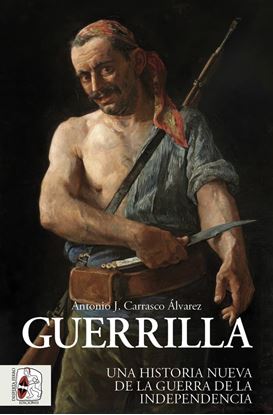

NOVEDADES
GUERRILLA. UNA HISTORIA NUEVA DE GUERRA
Considerados héroes por algunos, poco menos que bandoleros por otros, la historia de la guerrilla española de 1808-1814 se ha contado muchas veces y de muchas maneras. El propósito de este libro no es relatar una historia de héroes –aunque algunos lo fueron y pagaron su heroísmo con la vida–, ni repetir los lugares comunes sobre las partidas –el pueblo en armas–, aunque tampoco insistir en la visión pesimista de la guerrilla. Este libro analiza la guerrilla como un sujeto histórico con una identidad propia, que la distingue de otras insurgencias que la precedieron, y de las que han ocurrido después, y responde a la pregunta de qué habría ocurrido si las partidas no hubieran existido, si los hombres y mujeres que las formaron no hubieran tomado la decisión de combatir: ¿habría continuado España siendo un reino independiente? ¿O se habría terminado por convertir en un Estado vasallo de Francia, sujeto a la voluntad de Napoleón? Dicho de otra manera, ¿qué fue la guerrilla española y cuál fue su papel en la historia de las Guerras Napoleónicas?
2,200
CASO SAINT-FIACRE (BOL)
uando una carta anónima anuncia que durante la misa del Día de Difuntos se cometerá un crimen en Saint-Fiacre, el pueblo natal de Maigret en Bretaña, el comisario debe regresar a sus orígenes para evitarlo.
Al terminar la misa una feligresa ha muerto, como se había anunciado. Y Maigret, a pesar de haber estado presente y atento, no ha visto absolutamente nada que le permita saber quién o quiénes han cometido el crimen.
Con sus habituales paciencia y perspicacia, el comisario deberá internarse en los secretos de toda una comunidad, un mundo en vías de desaparición donde la pequeña noblesa local pretende dictar la ley sin miramientos ni compasión.
850
ENTRE LOS FLAMENCOS (BOL)
A título privado, Maigret se allega a la localidad de Givet, en la frontera franco-belga, para cumplir el encargo de ayudar a los Peeters, «los Flamencos», una familia de prósperos comerciantes. Todo el pueblo los acusa de haber matado a una muchacha francesa, pero el cadáver no aparece, y las dudas se multiplican.
El famoso comisario enfrentará en esta novela no solo una intriga, sino un drama familiar, en el que deberá sondear los silencios y los secretos de todo un clan para acabar erigiéndose en juez.
850
EL PERRO CANELO (BOL)
El inspector Maigret llega a la localidad de Concarneau, en Bretaña, para investigar el intento de asesinato de uno de los notables del pueblo. En mitad de las pesquisas, una serie de sucesos confusos parecen indicar que un asesino imparable trama una venganza colectiva, centrada en cuatro amigos que se reúnen habitualmente en el bar del pueblo. La única pista firme es un perro canelo que nadie había visto antes y que merodea por el vecindario.
850
LIBERTY BAR (BOL)
Lejos del ambiente brumoso y húmedo de la mayoría de los casos de Maigret, Liberty Bar nos lleva a la Costa Azul, donde el comisario llega para investigar el asesinato de un rico terrateniente australiano que había abandonado las convenciones y los deberes de su clase para darse la buena vida en compañía de un elenco de personajes variopintos reunidos en un bar de Niza.
Sin embargo, incluso en una atmósfera de vacaciones, el comisario descubriá que la naturaleza humana es oscura y, fiel a su divisa de comprender sin juzgar, revelará una tragedia doméstica de intereses cruzados.
850
AQUI TODOS MIENTEN (BOL)
William Wooler es, a primera vista, un padre y marido entregado. Pero ha estado teniendo una aventura que esa misma tarde ha tenido un horrible final en un motel de las afueras. Cuando regresa a casa, destrozado y enfadado, se sorprende al ver que Avery, su hija de nueve años, ha salido antes de la escuela y pierde los estribos.
Horas más tarde, la familia de Avery comunica su desaparición.
De repente, Stanhope ya no parece un barrio tan apacible. Y William no es el único que esconde una mentira. A medida que los testigos aportan información, que puede o no ser cierta, sobre la desaparición, los vecinos de Avery se muestran cada vez más desquiciados.
¿Quién se ha llevado a Avery Wooler?
800
ENSAYOS ELEMENTALES
Un fascinante compendio de ensayos a medio camino entre la poesía y el ensayo antropológico.
Desde que se iniciara como escritor, Eliot Weinberger encontró en el ensayo un territorio inexplorado que a partir de entonces no ha dejado de investigar. Ha creado un fascinante compendio de antropología universal reduciendo la distancia entre la poesía y la narrativa hasta lo ínfimo, y así ha renovado profundamente la forma del ensayo contemporáneo. En estos Ensayos elementales el lector encontrará parte de los textos publicados a lo largo de su trayectoria, así como otros inéditos hasta la fecha.
Un conjunto de ensayos de carácter único, cuyas trabadas piezas, que a menudo se entremezclan en la configuración de otras, confluyen en una prodigiosa variedad temática —del viento a los rinocerontes, pasando por los lagartos, los aztecas, Empédocles, los Chang o las abejas— y en un imaginario cultural en el que los límites entre las mitologías orientales y las ficciones occidentales también se difuminan.
Tomando de la poesía la versificación, la metáfora y la imagen; de la prosa enciclopédica, una voz veraz y un respaldo histórico documentado; de la tradición oriental, la proliferación de elementos naturales y cierto sedimento exótico-sagrado (son comunes las matemáticas y la geometría, los pequeños rituales casi tribales), Weinberger centra su atención en las particularidades de lo humano —sus sueños, literaturas y paisajes— y es capaz de darles forma con una escritura ambigua, muy sencilla, que convierte este corpus en un ejercicio de imaginación poética superlativa.
1,600
OPOSICION
La narradora de esta novela estudia para consolidar su futuro profesional. Ha conseguido un puesto de interina en una oficina administrativa, y afrontar una oposición parece ser el paso lógico en su carrera. Sin embargo, otro tipo de oposición, la interna, basada en su observación del día a día funcionarial, hace que no lo tenga nada claro. El edificio donde ha sido destinada, tan gigantesco como hermético, es un lugar de jerarquías incomprensibles, que la expulsa al mismo tiempo que la absorbe. Como nadie le explica sus funciones, se ve forzada a improvisar, disimular por vergüenza y registrar su malestar con dibujos y poemas tan desplazados de la realidad como el trabajo mismo. Los funcionarios que la rodean, cada uno con sus particularidades y conflictos, han desarrollado los tics y las manías propios de las rutinas laborales y la obediencia acrítica.
1,250
EL NUEVO ESPIRITU DEL MUNDO
El mapa de una nueva épocaTrump ha sacudido los cimientos de la política, la economía y las relaciones internacionales. La onda expansiva de sus decisiones ha dinamitado el orden existente y conduce hacia un cambio de época en el que las incertidumbres se disparan. Es un tiempo de demasiadas inquietudes y pocas respuestas claras que demanda nuevas claves para interpretarlo.
Esteban Hernández, que se ha consagrado como uno de los analistas políticos más lúcidos de España gracias a su cartografía de los cambios socioeconómicos e intelectuales contemporáneos, ha sido pionero en bucear en los planteamientos de las nuevas derechas. Su último ensayo resulta indispensable para entender el origen y el porvenir de las fuerzas políticas desatadas por Trump, tanto en EEUU como en Europa.
Hernández dibuja en este texto un mapa que permite comprender los cambios que están dando forma a nuestra sociedad y cuáles son las líneas ideológicas, culturales y económicas que están configurando un orden distinto. Con un estilo lúcido y provocador, el autor nos invita a reflexionar sobre una era turbulenta y sus vías de salida. Un análisis imprescindible para capturar el presente.
1,700




























